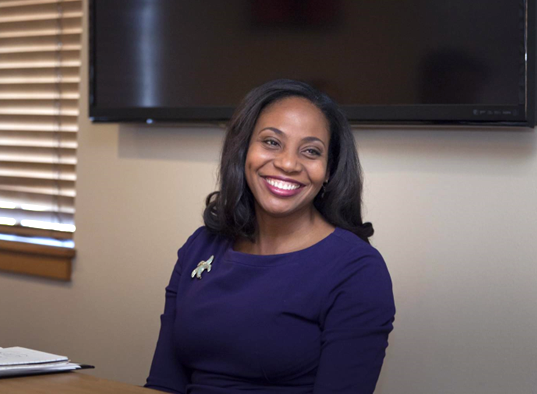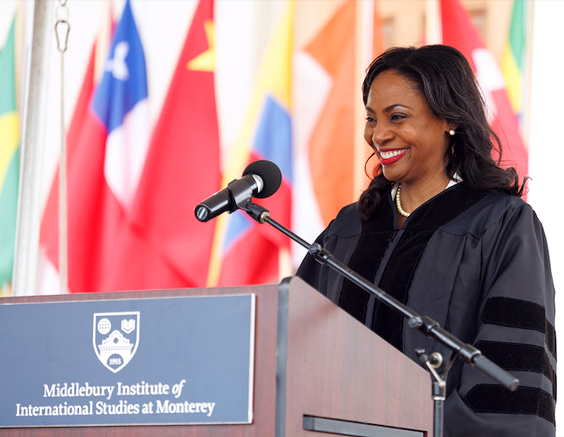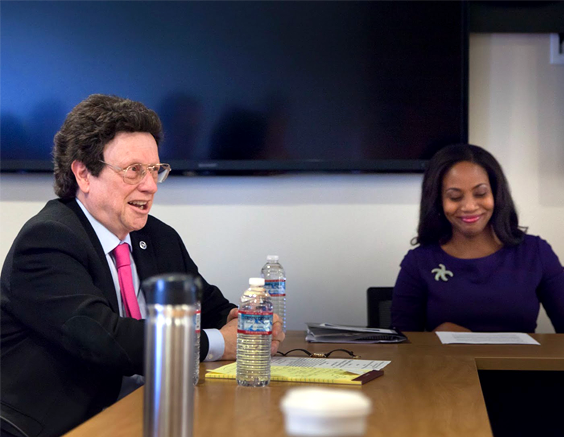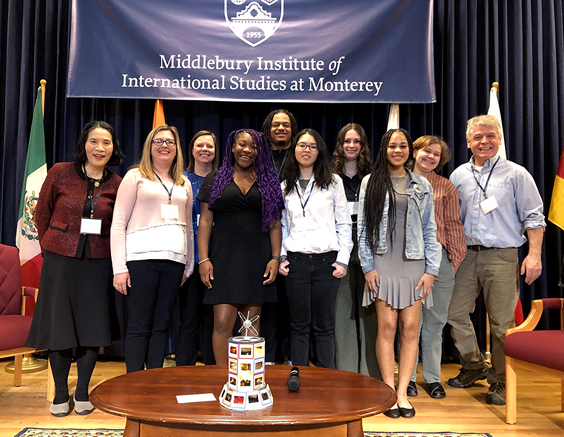June 4, 2024
Ian Driscoll

In 2005, when Shorna-Kay Richards first learned of the Center of Nonproliferation Studies (CNS) as a UN Disarmament Fellow, the world faced many of the same challenges as it does today. But fast forward almost 20 years to this month when she returned to Monterey, and things were different. She was returning as Jamaica’s ambassador to Japan, a highly accomplished diplomat and a staunch advocate for nonproliferation. The Middlebury Institute of International Studies had invited her to give the commencement speech for the Spring graduating class of 2024. During her speech she recognized CNS’ invaluable work in nonproliferation.
While Ambassador Richards returned to Japan to continue her vital work as a diplomat, she kindly agreed to participate in a written Q&A about her experience with CNS. Some of the questions and answers have been edited for clarity.
Q: Ambassador Richards, during your speech you spoke about how in 2005 you received training from CNS as a UN Disarmament Fellow. Was there a specific moment or memory that stood out to you about that experience?
Ambassador Richards: The final leg (the last three weeks) of the two-month long UN Programme of Fellowship on Disarmament took place at the UNHQ in New York in October 2005. I do have two specific recollections of the training from CNS:
Overall, the lectures were impactful and beneficial. And what stood out for me specifically was the highly interactive nature of the sessions and the inclusion of course work which allowed fellows to apply knowledge gained during the program and hone our critical thinking skills. In fact, each of the 30 fellows had to prepare a research paper, within a three-week timeframe, on a topic pertaining to the disarmament and non-proliferation agenda. I recall writing about an issue which remains on the agenda of the deadlocked Conference on Disarmament– “Prevention of an Arms Race in Outer Space (PAROS)”.
Another moment that stood out for me was the in-depth and spirited discussions we had on the NPT and, in particular, the failed 2005 Review Conference. And we were asked to assess whether this conference was a failure or a wake-up call. Interestingly, a big question in our discussion was whether the NPT would survive, should it be replaced, and if so, what should replace it. I never imagined that 10 years after the CNS lectures, I would be part of deliberations on similar questions about the NPT, as a First Committee delegate, within context of the failed 2015 NPT Review Conference and a year later in the Nuclear Ban Treaty Process. CNS training prepared me well for participation in these deliberations at the UN.
Q: You stressed the importance of ‘multicultural collaboration’. Why do you think places like CNS are essential in training the next generation of leaders around the world to foster multicultural collaboration?
Ambassador Richards: Multicultural collaboration is a prerequisite to addressing current and emerging global issues/challenges which are increasingly interlinked and complex. Indeed, addressing these challenges requires multicultural collaboration and an interdisciplinary approach – including a diversity of actors and perspectives– to devise equitable and sustainable solutions.
In this vein, institutions like CNS, which are deeply committed to diversity, inclusion, and equity, utilize inter-disciplinary and intersecting approaches and embrace intercultural communication, are best positioned to train the next generation of leaders around the world to foster multicultural collaboration. As it approaches the 35th anniversary of its founding, I hope that CNS will continue to provide this essential training of young leaders from around the world, including my region.
Q: In your commencement speech, you mentioned that Dr. Potter and Ms. Masako Toki and many more at CNS, are leading champions of disarmament education and youth empowerment around the world. I wondered if you could give an example of how they have inspired you to remain on your professional path as a leader for disarmament.
Ambassador Richards: It was my good fortune to meet Dr. William Potter, world renowned guru in field of disarmament and non-proliferation, in May 2016 at the third session of the Open-ended Working Group on Taking Forward Multilateral Nuclear Disarmament Negotiations in Geneva. And since our meeting he has not faltered in his efforts to ensure that I remain in the field of disarmament and nonproliferation even though my tenure at the Jamaican Permanent Mission to the UN ended in July 2016.
In fact, in July 2016 and just a few days before my departure from New York to take up my new role as Director of Bilateral relations in my Capital, Dr. Potter invited me to deliver a lecture at the Summer School on Nuclear Disarmament and Non-Proliferation in Mexico City. This ensured that there would be no lapse arising from my transition from multilateral work to bilateral diplomacy. And since this experience, I have been doing disarmament on the side! He is indeed a mastermind!
I must share that following the adoption of the Treaty on the Prohibition of Nuclear Weapons in 2017, Dr. Potter invited me to deliver a lecture at the CNS in November 2018 to highlight the contribution made by the Small Island Developing States of the Caribbean to the negotiation of the historic Treaty on the Prohibition of Nuclear Weapons. This for me was also a clear demonstration of his commitment to diversity and inclusion –in that instance ensuring that the perspectives and contribution of small states were shared more widely, thereby amplifying the recognition and value of our contribution. Moreover, I must attribute the speeches and lectures I have delivered over the past eight years on disarmament related issues to Dr. Potter’s encouragement and support.
I very much share his view that “if we are to make any dent in the armor of nuclear deterrence, it will have to come from our youth, who combine a great deal of energy and idealism and are not as cynical as their elders”. I am committed therefore to supporting his pioneering and life’s work on disarmament education and youth empowerment.
Masako Toki is fiercely committed to disarmament education and youth empowerment. For me her belief in the power and agency of young people is unmatched. And I am so inspired by her vision as well as her tireless and creative efforts to equip the youth from around the world to work for greater causes, including peace, nuclear disarmament, and social justice.
Masako Toki (left) has been instrumental in enabling CIF to further enhance its collaboration with the the Bread Loaf Teacher Network (BLTN) and the the Bread Loaf Next Generation Leadership Network
I am deeply grateful and privileged that Masako has enlisted me in her quest and life’s work to empower young people. In fact, it is thanks to her vision and efforts that I had the extraordinary opportunity to address the 2024 graduating class at MIIS Spring commencement ceremony. And in many ways, I see Masako as part of the connecting dots helping me to continue fulfilling the promise I made nearly 20 years ago to the brave and courageous hibakusha to advance their plea and advocate for a world free of nuclear weapons.
Since my assignment to Tokyo in 2020, Masako has been a key source of knowledge, advice, and encouragement not only in the preparation of the lectures I have delivered on peace and nuclear disarmament at Japanese universities and high schools, but also in my engagements with Japanese officials and civil society on these issues.
Thank you, Ambassador Richards for answering our questions and inspiring future leaders to engage in nonproliferation!

Shorna-Kay Richards, Jamaica’s ambassador to Japan received an honorary doctorate degree in recognition of her work as a diplomat and disarmament advocate. (Credit: Rob Ellis )


